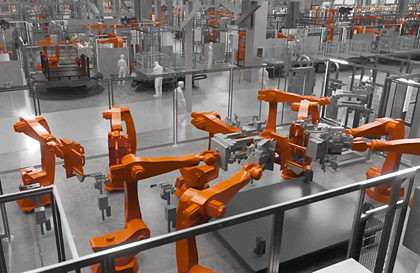- Home » News » World News
BMW runs new plant virtually, two years before it opens

The German car-maker BMW has started to “operate” a new plant virtually, more than two years before the real factory begins production. In what it calls a “revolution in factory planning,” virtual manufacturing is already underway for its Debrecen factory in Hungary, which is due to start producing BMW’s next generation of all-electric models, the Neue Klasse, in 2025.
The factory will be BMW’s first facility to be planned and validated completely virtually. The company is using Nvidia’s Omniverse Enterprise industrial metaverse platform to run real-time 3D digital twin simulations to help optimise the factory’s layout, robotics and logistic systems.
The platform allows manufacturers to plan and optimise factory projects entirely virtually, and to enter production faster and operate more efficiently, improving time-to-market and sustainability. It will help them to reduce risks, and to ensure that new plants will operate successfully, before committing to massive construction projects and capital expenditures.
BMW regards the virtual planning approach as a blueprint for future planning processes in the group. It plans to extend these capabilities to its sites around the world.
“Virtualisation and artificial intelligence are accelerating and refining our planning,” explains Milan Nedeljković, BMW’s board member for production. “With the various planning systems consolidated within a digital twin, our teams around the world can now work together in real-time and make decisions faster and on a more solid foundation. This makes us much quicker and more efficient and saves on costs as well.”
The Neue Klasse vehicles, based on a new architecture, will mark a fundamental transformation to BMW’s iFactory concept, which Nedeljković describes as “our masterplan for the automotive production of tomorrow”.
The transformation started in in 2020, when BMW started to 3D-scan all of its vehicle and engine plants. Since then, it has scanned more than 7,000,000m2 of indoor and 15,000,000m2 of outdoor production space. Any subsequent modifications can be integrated digitally with a re-scan, ensuring that the data is always up-to-date.
Virtual planning is now under way for the 1.4km2 production hall at Debrecen. The Omniverse platform is allowing production experts to use live data both in-house and with suppliers for detailed planning and to optimise the processes and individual systems for the plant. Structure and facility data can be integrated with equipment and assembly line data. In future, items and part numbers for production materials will be available as well.
Alternative layout options – for robots in work cells, for example, or for logistics areas – can be viewed as real-time, photorealistic simulations, and changed as required. Any modifications can be evaluated, validated and implemented in real-time. BMW’s suppliers can be involved in the decision-making.

For example, the technology can be used to explore the possibility of adding a robot in a location where floor space is limited. It can solve the problem on the fly, with logistics and production planners able to visualise and decide the ideal placement for the robot. “This is transformative – we can design, build and test completely in a virtual world,” says Nedeljković.
At a later stage, product, process, quality and cost data will be available in the Omniverse platform, alongside the development, planning and production processes. Other additions are expected to include “invisible” processes such as the consumption of energy and resources.
The platform will enhance digital operations as well – a crucial stage that BMW and Nvidia teams are already tackling. Also in the future, it will be possible to localise operational faults in seconds to minimise downtime.
The Omniverse platform simplifies collaboration across sites and time zones and supports the planning and design of structures, production systems and processes at a new technological level. It works as a “cockpit”, offering easy access to digital planning. The cloud-based and cloud-agnostic platform will be available soon to BMW experts in various technologies, as well as the car-maker’s planning departments.
“Digitalisation is moving fastest in the automotive industry and BMW has been a leader in advancing this vision,” says Nvidia’s founder and CEO, Jensen Huang. “We are partnering closely with BMW, using Nvidia Omniverse to help streamline their manufacturing processes, enhance collaboration and further efficiency. Our collaboration will continue to push the frontiers of virtual integration for the next generation of smart, connected factories around the world.”
BMW Group: Twitter LinkedIn Facebook
Nvidia: Twitter LinkedIn Facebook





